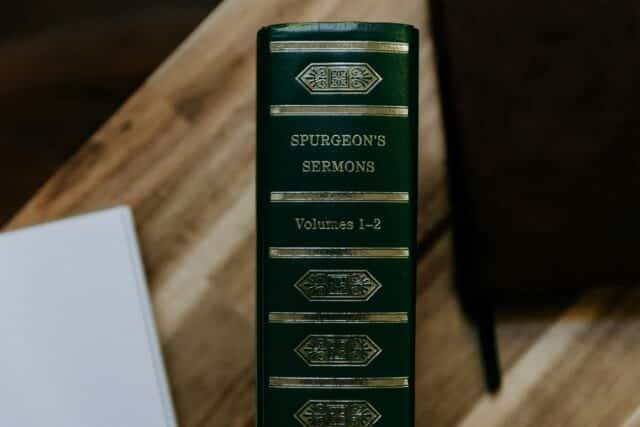Article
Spurgeon on the Preaching Voice
Spurgeon believed there are a few things we can do to make sure we are using our God-given voice for the best sermons possible.

You know a great preaching voice when you hear it.
Some men, blessed by God, are equipped with Dolby Surround Sound vocal cords. Their voice is powerful, arresting, interesting, and a delight to listen to. I’ve joked before that I would listen to Ray Ortlund read the phonebook. John Piper has a unique tone and gravity. R.C. Sproul was blessed with one of the best preaching voices of all time. Spurgeon had one of these voices too. His voice was described as sweet, musical, clear, well-modulated, thrilling, a baritone that would ring as clear as a bell.
How’s yours? What can we do about our voice?
Spurgeon believed there are a few things we can do to make sure we are using our God-given voice for the best sermons possible. In a lecture titled “On the Voice,” here are some of his key takeaways to think about our voice in preaching.
1. Don’t Think Too Much About It
Spurgeon begins with a reminder that preaching is not a performance. “Our first rule with regard to the voice would be—do not think too much about it, for recollect the sweetest voice is nothing without something to say, and however well it may be managed, it will be like a well-driven cart with nothing in it, unless you convey by it important and seasonable truths to your people.” A great voice with nothing to say is a great waste.
At the end of the day, the power in our sermons isn’t from our voice—it’s in the gospel truth of God that we preach. Even if we have a less than polished sermon and delivery, God’s word will accomplish his purpose (Isaiah 55:11).
Don’t let the current state of your preaching paralyze you. Trust God, preach the gospel, and let it rip.
2. But Don’t Ignore Your Voice Either
While point 1 is true, Spurgeon also says, “On the other hand, do not think too little of your voice, for its excellence may greatly conduce to the result which you hope to produce.”
While God is the one who makes things happen, this doesn’t excuse us from thoughtless use of our voice when preaching. He uses us. He uses our voices. And we want people to be able to hear.
We’ve all heard teachers, preachers, presentations, or speeches that were insufferably boring because the person’s voice was better suited for silent films. Or, maybe at their peak, they sound like Charlie Brown’s teacher, “Wah wah woh wah, wah wah.” Spurgeon describes what this kind of preaching is like:
“Its tone was still the same, a dreary waste of sound, a howling wilderness of speech in which there was no possible relief, no variety, no music, nothing but horrible sameness.”
Think about how difficult it is to identify a song when someone only hums it or plays the melody by slapping their knee. It’s impossible. The same goes for preaching. A sermon should have a variety of notes, pitches, and volume, intentional repetition; otherwise, people will probably say, “I have no idea what he’s talking about.” As Spurgeon says:
Brethren, in the name of everything that is sacred, ring the whole chime in your steeple, and do not dun your people with the ding-dong of one poor cracked bell.
3. Work on Your Vocal Tics
Every preacher is different, which also means we have different things to work. Spurgeon, “In the next place, if you have any idiosyncrasies of speech, which are disagreeable to the ear, correct them, if possible.”
In high school, my speech teacher would end every other sentence with, “Mkay?” I remember thinking, “And you are the teacher of speech?” Twenty-five years later, and I still only remember her vocal tic. Her tic trimmed her credibility and listenability. Brothers, be mindful of any tics.
I’ve found in many young guys learning to preach that they have these unnecessary fillers between sentences—“Right?” or “You know?” or, the classic, “Uh.” Silence is better than vocal stuffing. Whatever your vocal oddity may be, you can work on it. Intonation, dragging out words, over-clearing your throat, or even spinning your wedding ring while you talk—pay attention to the task. Your voice is your instrument. Tune it. Your posture, gestures, and presence frame what you say.
4. Vary Your Volume and Tone
Brothers, loud preaching doesn’t equal great preaching. It is good to have energy, zeal, and passion, but being yelled at is an unpleasant experience. Don’t confuse loudness with the filling of the Spirit. Spurgeon put it well:
“Do not give your hearers head-aches when you mean to give them heart-aches: you aim to keep them from sleeping in their pews, but remember that it is not needful to burst the drums of their ears. ‘The Lord is not in the wind.’ Thunder is not lightning. Men do not hear in proportion to the noise created.”
I remember being 25 and preaching a sermon on the love of God. I was brimming with enthusiasm. I was proclaiming, heralding, and excited about God’s love. After the sermon, on the drive home, I asked my wife what she thought about the sermon. She said, “It was good. But did you have to yell at me about the love of God?” What a helpful insight from my dear wife. I hadn’t learned that volume isn’t the only way to communicate gravity. Volume and tone should match the passage and the subject. Spurgeon points this out as well:
“Gentlemen, a needful rule is—always suit your voice to your matter. Do not be jubilant over a doleful subject, and on the other hand, do not drag heavily where the tones ought to trip along merrily, as though they were dancing to the tune of the angels in heaven.”
Be joyful when you preach on joy. Be urgent when speaking of hell. Be inviting when you talk about the gospel. Don’t scowl when talking about forgiveness from God. Match your voice, tone, and face to the text.
5. Be Yourself
It’s been said that imitation is the sincerest form of flattery. Sure. And it can also be the sneakiest form of robbery.
When you preach, don’t copy and paste the mannerisms, inflections, and tone of others. Learn from your favorite preachers, but don’t mimic them. It is good to draw inspiration and ideas from others, but weak imitation is theft—it robs your church and you of God’s working in you. Spurgeon charges, “I charge you throw away the servility of imitation and rise to the manliness of originality.”
6. Don’t Drink Chili Vinegar
This last piece of advice is one we can all avoid. Spurgeon shared in this lecture that when he was preaching at the large Exeter Hall, his voice would grow tired. His remedy? “I always had a little glass of Chili vinegar and water just in front of me.”
You can try it if you want, but I’ll stick with a room temperature bottle of water. Avoid cold.
Use your voice, brothers. “How, then, can they call on him they have not believed in? And how can they believe without hearing about him? And how can they hear without a preacher?” (Romans 10:14). Let the people hear you.




